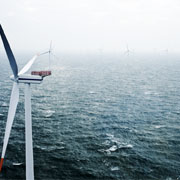
|
contents | business | |||||||||
| Explosive growth in Indian renewable energy market  Already the world's fifth-largest country in terms of installed renewable energy capacity, India is on course to become one of the largest renewables markets in the world in the coming years. Already the world's fifth-largest country in terms of installed renewable energy capacity, India is on course to become one of the largest renewables markets in the world in the coming years.Recently the Prime Minister of India announced ambitious plans to develop renewable energy in India, with the goal of reaching more than 200 gigawatts of renewable energy by 2020, with wind energy constituting almost half of this. Setting such ambitious renewable energy targets is not new for India; in 2015 the government released a plan to increase renewable power capacity fivefold in only seven years. Speaking in Copenhagen at a 'Renewable Energy in India' seminar, organised by Ramboll and the Indian Chamber of Commerce, the Indian Ambassador to Denmark, Ajit Gupte, said that these "developments reflect a greater shift in renewables. The renewables capacity has doubled in the last four years. Older targets have been met and newer ones put in place, and it has led to prices for renewables decreasing as capacity has increased." Danish companies such as Ramboll are well poised to contribute to the market, particularly in sectors such as offshore wind and waste-to-energy. While still in its infancy, offshore for example, has a target for 2030 that is double the capacity of the European Union, and the Danish government is planning to open an Indo-Danish knowledge centre for the development of wind energy in India. Another potential growth area is waste-to-energy. Being such a populous country means that there is significant waste generation in India and for local authorities, the "focus has been on collection rather than the treatment and proper disposal of waste, " said Nils Christian Holm, Global Spearhead Director for Energy from Waste at Ramboll. The Indian government is keen to improve the situation using waste-to-energy and while he urges caution in a promising but uncertain market, Nils Christian Holm contends that as long as projects are approached in the right way, there is much potential. "It is essential for local authorities to undertake comprehensive planning and preparation, " he said. "Waste-to-energy facilities must fit into a plan and it is important to consider the right technology. Municipal solid waste is a tricky 'fuel' so we need to use robust and proven technologies that are designed for the situation in India." write your comments about the article :: © 2018 Construction News :: home page |